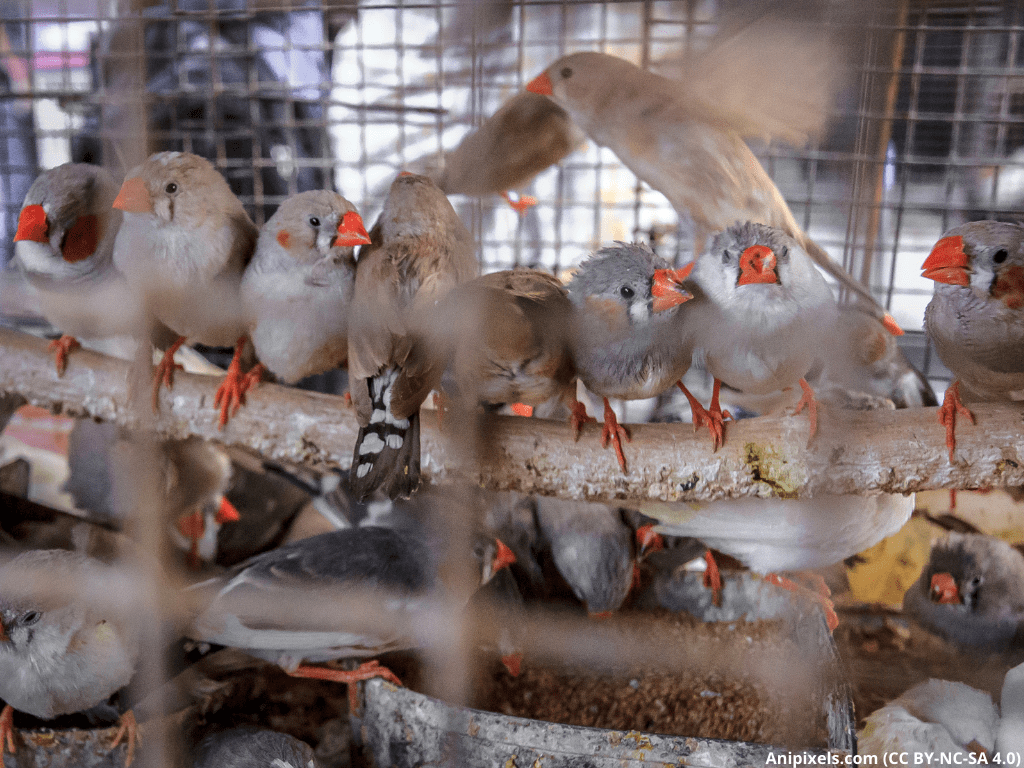UN INT Intro Text w/ Centered Large Responsive Image - *Important Note* You must UNLINK this shared library component before making page-specific customizations.
Everyone who had to stay inside their homes during the COVID-19 lockdowns knows how quickly the walls start to close in, but at the time, we also knew this ordeal would eventually come to an end. For caged birds, however, who will never know freedom, lockdown is for life. Nothing is more essential to a bird than free flight.
India’s bird trade causes immeasurable suffering. All caged birds are either captured or bred in captivity. Wild birds are caught in traps or nets that can seriously injure or kill them as they struggle to break free. Once caught, they are crammed into small suffocating boxes. An estimated 60% die in transit as a result of broken wings and legs, thirst, or sheer panic. Those who survive face a bleak life in captivity, often suffering from malnutrition, stress, and depression.
Avian welfare expert Dr Kim Danoff notes, “Depriving birds of flight is mentally and physically stressful. Some birds respond by plucking their feathers out; some become aggressive. It also contributes to poor health including weak and atrophied muscles, cardiac problems and respiratory problems.”

Keeping these intelligent and sensitive animals in cages is not only cruel but also illegal.The Wild Life Protection Act, 1972, bans the capture and trade of hundreds of varieties of indigenous birds. Meanwhile, The Prevention of Cruelty to Animals (PCA) Act, 1960, makes it illegal to keep an animal in a way that prevents “a reasonable opportunity for movement” – for a bird, that means flight. The central government statutory body the Animal Welfare Board of India (AWBI) has issued a fresh advisory to all states and union territories asking them to issue directions to ensure a ban on caging aerial birds. And the authorities in various Indian states have issued also put out against the caging of birds.
In the wild, these birds are never alone. If separated from their flockmates for even a moment, they call wildly to them. They preen each other, fly together, play, and share egg-incubation duties. Many bird species mate for life and share parenting tasks. The evidence of their close companionship and concern for one another is plain for anyone to see.
In cages, these birds, driven mad from boredom and loneliness, often become aggressive and self-destructive, pulling out their feathers, mutilating their skin, bobbing their heads incessantly, pecking repeatedly at cage bars, regurgitating, pacing, and shaking or even collapsing from anxiety.
Today, the world is battling COVID-19, a life-threatening zoonotic disease (which spread from other species to humans), believed to have first infected humans through close contact with animals. Birds may transmit zoonotic diseases to humans such as psittacosis, histoplasmosis, and cryptococcosis. Thus, keeping birds in their natural habitat helps prevent the spread of diseases.
If the coronavirus crisis has taught us anything, it’s that sometimes, we must sometimes change our ways. Going forward, we should also apply this thinking to how we treat birds.
You can help birds by signing this petition against their being caged.
THE COMPILED SIGNATURES WILL BE DELIVERED TO THE MINISTER OF FISHERIES, ANIMAL HUSBANDRY AND DAIRYING REQUESTING AN AMENDMENT IN THE PREVENTION OF CRUELTY TO ANIMALS ACT, 1960, TO PROHIBIT HABITUAL CONFINEMENT OR CAGING OF ANY AERIAL BIRDS.